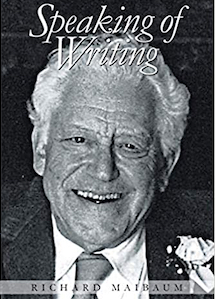By Kevin Douglas
Richard Maibaum (ΦBK, University of Iowa) might just be the most influential Hollywood screenwriter that you’ve never heard of. Best known for writing and co-writing 13 films in the James Bond franchise, Maibaum had his hand in an additional 34 films, 11 plays (4 of which were produced on Broadway), and 5 teleplays. His prolific writing career spanned 60 years, during which he frequently lectured at his alma mater, the University of Iowa, as well as UCLA, USC, and various other schools. He taught for a year at the University of Iowa before returning to Hollywood as a full-time screenwriter, but his notes, lectures, and articles suggest that he had the spirit of an educator. Maibaum passed away in 1991, but his teachings have been compiled and published posthumously in Speaking of Writing (2019). The book captures Maibaum’s humor, wit, and insight into both the writing process and the entertainment industry as a whole.
The book opens with a foreword written by Sylvia Kamion Maibaum, where she provides a biography for her husband Richard. He was born in the Bronx in May 1909. Richard met Sylvia at Evander Childs High School, in New York City. Maibaum excelled as a student. He attended NYU before transferring to the University of Iowa, where he graduated summa cum laude and ΦBK. With a major in speech and dramatic art, he spent his college years writing plays. His play The Tree was produced while he was still an undergraduate student.
Maibaum attracted Broadway producers with his strong writing abilities and his bold political stances. The Tree was the first anti-lynching play to be produced on Broadway. It premiered in 1931 at Park Lane Theater. His other plays continued to speak to the current historical moment. Singing Acres, published in 1933, captured the toll of the Great Depression on Midwest farmers. Birthright (1933) was the first anti-Nazi play produced on Broadway, inspired by Maibaum’s experience with German Jewish refugees he had met in London. Both his works and his lectures indicate a passion for storytelling and social justice. In her foreword, Sylvia Maibaum notes that a major interest for her husband was to “shake people’s consciences and inspire others to a new understanding of problems and issues of the time.”
Speaking of Writing captures Maibaum’s natural, charismatic voice. Reading the book feels like sitting across from Maibaum as he recollects his experiences in real time. His lecture on Russian drama starts with him wondering aloud why he’s been asked to speak on the subject. He comes to the conclusion that the professor for the class must associate him with Russian dramatists because of the “unusually long hair” he had when he was “an ardent youth who rarely got a haircut,” which made him “look like a fella with a poetic soul.” His charm really shines through in his lecture, “How to Write a Successful Play.” Every time he claims to know what makes a successful play, he contradicts himself, naming a play that does the opposite. At the lecture’s end, he leaves his students with this:
“Go figure it out! There is no way to certainly write a successful play, and there is no formula to ensure it. And now, to add to your confusion and bewilderment, I shall be glad to answer any questions not only on this subject but any other except why doesn’t UCLA play Loyola in football? Yes. Any questions?”
Creative writers are always seeking foolproof tips and tricks – quick ways to crack the code and bust out the perfect story. Any number of online master classes will tell you what structure to use, how to create characters, etc. But Maibaum’s book feels less like a cheat sheet and more like a heart-to-heart conversation. His writing gives you terrific insight into the life of a writer, but he never pretends to have all the answers. Despite his Goliath of a career, his lessons are as approachable as his disarming smile on the book’s cover.
Richard Maibaum’s son Matthew can attest to his father’s warmth and intelligence. Richard Maibaum “was seen by others as very nice, tactful, compassionate – very dignified without coming off as stuffy,” Matthew recalls. “He was an early 20th century kind of guy.” While Speaking of Writing captures some of Richard’s wit, Matthew says that “to capture the totality of his sense of humor, you’d have to sit with him at the dinner table.” More than anything, Matthew thinks what made his father so approachable was his unwavering sense of optimism. “When he looked at life, instead of getting exasperated, he always stayed hopeful. He never looked at someone and said, ‘They’re doing something dumb.’ He would observe the world like a little boy, always fascinated by it.”
Phi Beta Kappa’s name is derived from the motto, “a love of learning is the guide to life.” Richard Maibaum strove to learn – not just in a classroom, but on a day-to-day basis. “He was always going to the library and researching things,” Matthew says. “He had an encyclopedic sense of knowledge. … He would say, ‘Learning doesn’t just happen in a classroom, sitting in front of your teacher. What you learn in school should inspire you to go out into the world and learn things on your own.’”
For any aspiring writers out there – or anyone looking for a fun read and a peek behind the Hollywood curtain (especially the James Bond franchise) – Speaking of Writing is worth your time.
Kevin Douglas is a senior at the University of Denver majoring in theater and English. The University of Denver is home to the Gamma of Colorado chapter of Phi Beta Kappa.




